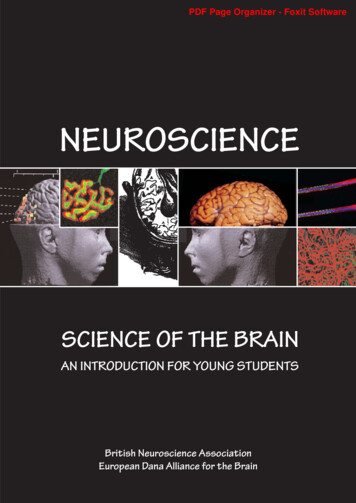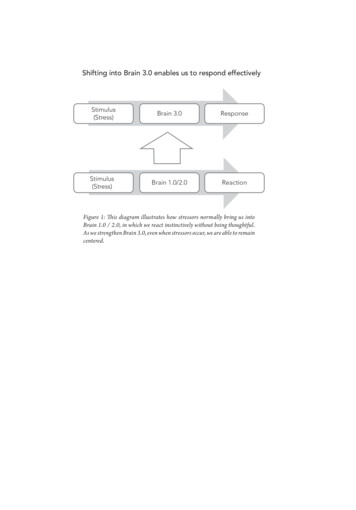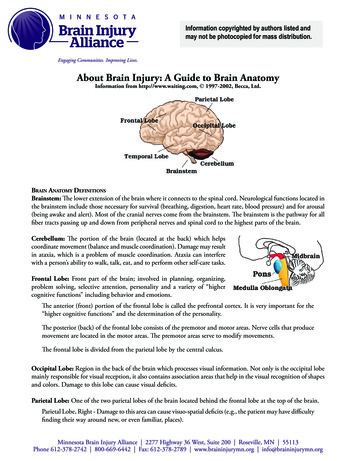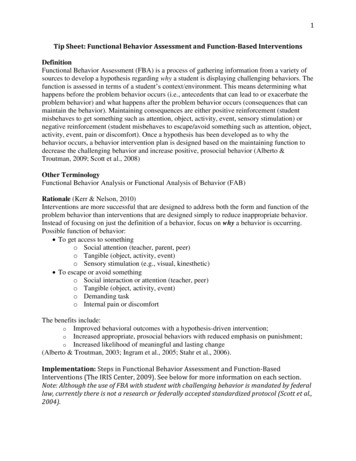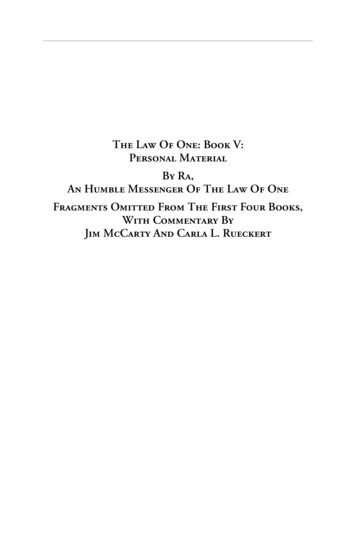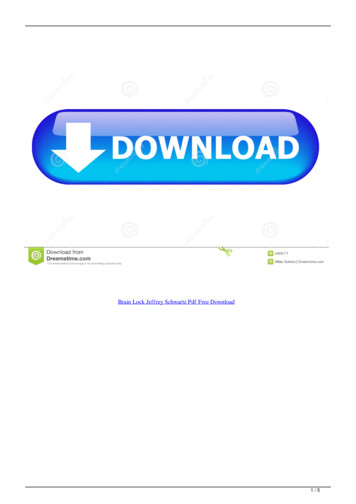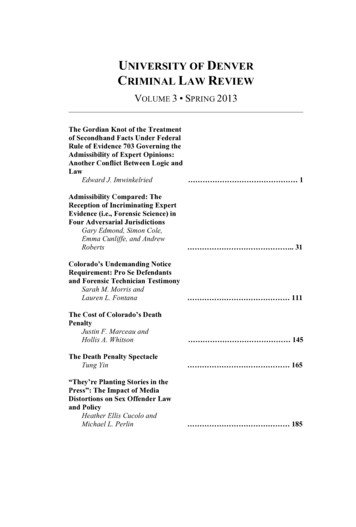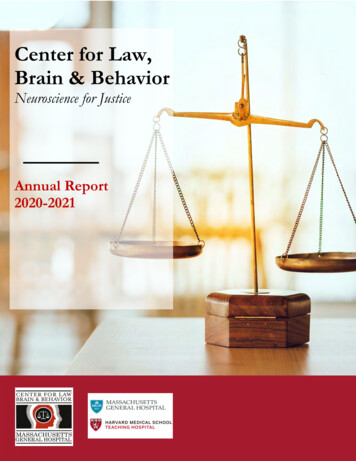
Transcription
1Center for Law,Brain & BehaviorNeuroscience for JusticeAnnual Report2020-2021
2Table of Contents3From the Executive Director4Mission and Strategic Priorities6Leadership7Board of Advisors9Faculty10Staff13Highlights14Leadership AchievementsPrograms and Initiatives15Juvenile and Emerging Adult Justice18Criminal Sentencing20Immigration and Asylum Justice22Aging Brains and Elder Justice24Racial Justice27Additional Public Engagement31Education and Training34Social Media Year in Review
3From the Executive DirectorDear Advisory Board,CLBB has continued to dynamically evolve during 2020-2021. We completed the transition to afull-time executive director position following the remarkable three-year tenure of my predecessorDr. Francis Shen. We added distinguished persons to our Advisory Board and accomplishedprofessionals to our Affiliated Faculty. We built or strengthened relationships with the FederalJudicial Center, Northwestern University’s Pritzker School of Law, Northeastern University Schoolof Law, innovative youth-serving agencies, legal and judicial educators, policy institutes, andadvocacy groups, and the Office of the District Attorney in Suffolk County, Boston.CLBB’s unique mission is to bring neuroscience to law and public policy. Neuroscience is apowerful tool to prevent crime and reduce recidivism, improve outcomes of those who are courtinvolved, and afford greater community safety. It’s a powerful tool to protect vulnerable eldersagainst exploitation and maltreatment while also recognizing their dignity and autonomy. It’s apowerful tool to shield asylum-seekers from injustice and suffering arising from deeply flawed ideasabout human memory and trauma. It’s a powerful tool to give young people a chance to redeemthemselves after a thoughtless, reckless, or even catastrophic act.While we have had clear impact in each of these program areas, our challenge is to take them toscale. Each day brings new inquiries from judges, attorneys, legal and judicial educators, law schoolfaculty, criminal justice advocates and policy-makers seeking information and assistance. As we arestill staffed mostly by volunteers, we can respond only to the carefully selected requests andopportunities. As a result, an important achievement of the past year has been to plan for theexpansion of our capacity through a formal fundraising campaign.This endeavor, titled the Neuroscience for Justice Campaign, will provide CLBB the resources toimplement transformational reforms and to contribute more fully to criminal justice and socialequity. With increased charitable support, we can translate and disseminate neuroscience findingsand their pragmatic application to law and public policy. We will do so by educating more judges,providing tool kits for practicing attorneys, creating an open access digital library of actionableneuroscience, and launching and evaluating innovative pilot reform projects with communitypartners.I am honored to have been given the charge to advance the mission established by our founders andco-directors Dr. Judith Edersheim and Dr. Bruce Price and to see these program initiatives tofruition. To succeed, your guidance and participation will be crucial. Thank you for yourcommitment to the CLBB mission. Together, we will help bring about a more reasonable, humaneand equitable justice system for all through the application of neuroscience.Sincerely,Robert T. KinscherffExecutive Director
4MissionThe Center for Law, Brain and Behavior strives to put the most accurate andactionable neuroscience in the hands of judges, lawyers, policymakers and journalists—people who shape the standards and practices of our legal system and determine its impactin people’s lives. We work to make the legal system more effective and more just for allthose affected by the law.Although the brain and the law are both complex, CLBB’s work is quite simple. We provideexpert training, tools and counsel, helping members of the legal community and justicepolicymakers to understand and apply the most relevant brain science to cases, communityand institutional practices, courtroom procedures and public policies.We also support those working across the media landscape who can accurately inform thepublic about the brain, human behavior and the justice system.The Center is led by accomplished legal and medical experts—practitioners, researchers andthought leaders—based at Harvard Law School, Mass General Hospital, Harvard MedicalSchool and other leading institutions of learning.CLBB works with partners as diverse as Roca, Suffolk County DA Office, Federal JudicialCenter, Securities and Exchange Commission, National District Attorneys Association,American Bar Association, Committee for Public Counsel Services, and Flaschner JudicialInstitute.Since CLBB’s founding in 2008, we have demonstrated the clear benefits of accuratelyapplied neuroscience: better decisions aligned with science lead to better outcomes alignedwith justice.
5Strategic Priorities1 Establishing more effective standards and practices forcriminal sentencing by helping judges and lawyers understand themost relevant applications of the neuroscience of decision-making.2 Ensuring more accurate evaluations and more effectivesolutions for juvenile and emerging adult justice by helpingjudges, lawyers and other key members of the legal ecosystem understandthe most relevant applications of the neuroscience of developing brains.3 Ensuring more accurate judgments in immigration andasylum cases, and changing legal standards through impactlitigation, by helping lawyers and judges understand the most relevantapplications of the neuroscience of trauma, family separation andmemory.4 Ensuring better protection and agency for older adults, especiallyin the process of estate planning and financial decision-making, by helpingjudges, lawyers, families and financial planners understand the mostrelevant applications of the neuroscience of aging brains.
6LeadershipSilda A. Wall Spitzer, JDAdvisory Board ChairCEO, Publisher and Co-Founder, New York MakersjJudith G. Edersheim, JD, MDFounder and Co-DirectorAssistant Professor of Psychiatry, Harvard Medical SchoolAttending Psychiatrist, Massachusetts General HospitalBruce H. Price, MDFounder and Co-DirectorChief, Department of Neurology, McLean HospitalSenior Clinical Neurologist, Massachusetts General HospitalAssociate Professor of Neurology, Harvard Medical SchoolRobert T. Kinscherff, PhD, JDExecutive DirectorProfessor, Doctoral Clinical Psychology Program at William James CollegejJudge Nancy Gertner, JD, MA (Ret.)Managing DirectorSenior Lecturer on Law, Harvard Law SchoolFederal Judge, U.S. District Court of MassachusettsLisa Feldman Barrett, PhDChief Scientific OfficerDistinguished University Professor of Psychology, Northeastern UniversityDepartment of Psychiatry and Martinos Center for Biomedical Imaging,Massachusetts General Hospital/Harvard Medical SchoolFrancis Shen, JD, PhDImmediate Past Executive DirectorProfessor, University of Minnesota Law SchoolExecutive Director of Education and Outreach, MacArthur FoundationResearch Network on Law and Neuroscience
7Board of AdvisorsSilda Wall Spitzer, JD, Chair, Co-founder and CEO, NewYorkMakers.comJennifer Jones Austin, JD, MA, Chief Executive Officer and Executive Director, Federation of ProtestantWelfare AgenciesNeal Baer, MD, MA, Emmy-winning Executive Producer and WriterJoan Belkin, Former First Grade Teacher; PhilanthropistSteven Belkin, Founder, Trans National Group; PhilanthropistAvis Buchanan, JD, Director, Public Defender Service for the District of ColumbiaPaul Butler, JD, Professor in Law, Georgetown University Law CenterRaluca Buttner, Artist; MIT Chemical Engineering graduateThe Honorable Katherine M. Clark, JD, Congresswoman, Massachusetts 5th District; Assistant Speaker,United States House of RepresentativesLeslie Cornfeld, JD, Founder/CEO, National Education Equity LabOphelia M. Dahl, Co-Founder and Chair of the Board, Partners in HealthJudge Andre Davis, JD (Ret.), Circuit Judge, United States Court of Appeals for the Fourth Circuit; CitySolicitor , Baltimore City Department of LawAndre De Fusco, CEO and President, Hawkeye Bio, Inc.Bianca De Fusco, International MarketingRodney S. Dowell, JD, Chief Bar Counsel, Massachusetts Board of Bar OverseersLisa Frantzis, Senior Vice President, Advanced Energy EconomyMartin Garbus, JD, First Amendment AttorneySusan Eve Haar, JD, Attorney; Author and Playwright, Ensemble Studio TheatreAdam Haar Horowitz, PhD Candidate, MIT Media LabRobert R. Hopper, JD, MPP, Founder and Managing Partner, Robert R. Hopper & Associates, LLCJames L. Joslin, CFP, Founding Principal, TFC Financial Management, Inc.Joan Kahn, Vice President, Women’s International Zionist Organization, USAPeggy Edersheim Kalb, Senior Editor, Yale Alumni MagazineScott E. Kalb, CEO, KLTI AdvisorsAndrew M. Moravcsik, PhD, Professor and Director, Liechtenstein Institute on Self-Determination and theEuropean Union Program, Princeton UniversityAnne Peretz, MSW, Founder and Chair, The Parenting JourneyWilliam Pietragallo, II, JD, Founding Partner, Pietragallo, Gordon, Alfano, Boscik, & Raspanti, LLPKevin Prussia, JD, Partner, WilmerHaleJohn Reinstein, JD, Attorney; Former Legal Director, Massachusetts ACLUJerrold F. Rosenbaum, MD, Immediate Past Chief of Psychiatry, Massachusetts General HospitalAnne-Marie Slaughter, PhD, JD, Professor, Princeton University; CEO, New AmericaEliot L. Spitzer, JD, Principal, Spitzer Enterprises; Former Governor of New YorkCarol W. Taylor, MA (Ret.), Executive Director of Development, Massachusetts General Hospital
8Emeritus AdvisorsRangita de Silva de Alwis, SJD, Associate Dean, University of Pennsylvania Law SchoolJudi Sorenson Flom, JD, AttorneyLaurie L. Gildan, JD, Attorney and Principal, Greenberg Traurig, LLPPhillip C. Gildan, JD, Attorney and Principal, Greenberg Traurig, LLPTherese Rosenblatt, PhD, PsychologistLidia Rosenbaum, EducatorH. Marshall Sonenshine, JD, Chairman and Managing Partner, Sonenshine PartnersThe Totalitarian Brain - Virtual Salon for Advisory Board Members and GuestsThe Center’s Board of Advisors gathered in April 2021 for the virtual event “The TotalitarianBrain,” featuring internationally renowned neuroscientist Dr. Lisa Feldman Barrett andAmerican author and historian Dr. Tim Snyder, moderated by CLBB Advisory Member andforeign policy analyst Dr. Anne-Marie Slaughter.The Advisory Board considered the social and intellectual predicates for tyranny and the uniqueattributes of the human brain which allow for the co-opting of socially constructed realities.The Advisory Board will convene on December 8, 2022 for a discussion of the updated editionof The Seven Sins of Memory: How the Mind Forgets and Remembers with author and WilliamR. Kenan, Jr. Professor of Psychology, Daniel Schacter. This updated edition revisits ProfessorSchacter's groundbreaking research with the twenty-first century’s cultural trends and scientificdiscoveries.
9Core and Affiliated FacultyJustin T. Baker, MD, PhDDir, Laboratory for Functional Neuroimaging &Bioinformatics; Scientific Director, Institute forTechnology in Psychiatry, McLean Hospital; Asst.Professor of Psychiatry, HMSEugene V. Beresin, MA, MDExecutive Director, MGH Clay Center for Young HealthyMinds; Director of Child and Adolescent PsychiatryResidency Training Program, MGH and McLeanHospitals; Professor of Psychiatry, HMSJay D. Blitzman, JD (Ret.)First Justice-Massachusetts Juvenile Court, MiddlesexDivision; Lecturer on Law, Harvard Law School;Instructor, Northeastern University School of Law;Adjunct Professor, Boston College Law School; Affiliate,Boston University Center For AntiracismDavid Borsook, MDDirector, Pain and Analgesia Imaging Neuroscience,Children’s Hospital Boston, MGH, and McLean Hospital;Professor of Anaesthesia, Children’s Hospital BostonJoshua W. Buckholtz, PhDAssociate Professor of Psychology, Harvard University;Director, Systems Neuroscience of Psychopathology lab;Assistant in Research, Department of Psychiatry, MGHRandy L. Buckner, PhDProfessor of Psychology and of Neuroscience, HarvardUniversity; Neuroscientist in Psychiatry and Radiology,MGH; Director, Psychiatric Neuroimaging ResearchProgram, MGHFiery Cushman, PhDProfessor of Psychology, Harvard University; Director,Moral Psychology Research LaboratoryBrad Dickerson, MDProfessor of Neurology, Harvard Medical School;Tommy Rickles Chair in Progressive Aphasia ResearchDirector, Frontotemporal Disorders Unit and Laboratoryof Neuroimaging, MGHJoshua Greene, PhDProfessor of Psychology, Harvard University; Member,Center for Brain Science faculty, Harvard UniversityEdward Hundert, MDDean for Medical Education, Harvard Medical School;Daniel D. Federman, MD Professor in Residence of GlobalHealth and Social Medicine and Medical Education, HMSSteven E. Hyman, MA, MDDirector, Stanley Center for Psychiatric Research, BroadInstitute of MIT and Harvard; Distinguished ServiceProfessor of Stem Cell and Regenerative Biology,Harvard UniversityJonathan Jackson, PhDExecutive Director, Community Access, Recruitment, andEngagement (CARE) Research Center, MGH and HMS;Instructor in Neurology, HMS and MGHMorgan Medlock, MD, MDIV, MPHChief Medical Officer and Director of Crisis andEmergency Services, DC Department of BehavioralHealth; Adjunct Assistant Professor of Psychiatry,Howard University HospitalAlisha Moreland-Capuia, MDFounder and Director, McLean Hospital’s Institute forTrauma Informed Systems Change; Psychiatrist, LEADERProgram; Affiliate Clinical Associate Professor, OHSUSchool of Medicine; Assistant Professor, HMSCharles A. Nelson, PhDProfessor of Pediatrics and Neuroscience and Professorof Psychology, HMS; Professor of Education, HarvardGraduate School of Education; Richard David ScottChair in Pediatric Developmental Medicine Research,Boston Children’s Hospital; Director of Research,Division of Developmental MedicineOlivia Okereke, MD, MSBoard-Certified Geriatric Psychiatrist and AssociateProfessor of Psychiatry and Associate Professor ofEpidemiology, HMS and the Harvard T. H. Chan Schoolof Public Health; Director of Geriatric Psychiatry andDirector (Research), Geriatric Psychiatry Clinical andResearch Program, MGHAmanda Pustilnik, JDProfessor of Law, University of Maryland School of Law;Director of the Program on Pain, CLBB; 2014-2015Senior Fellow in Law & Applied Neuroscience, CLBB andthe Petrie-Flom CenterKerry Ressler, MD, PhDProfessor of Psychiatry, Harvard Medical School; ChiefScientific Officer, McLean Hospital; Director, GradyTrauma Project
10Altaf Saadi, MD, MScGeneral Academic Neurologist, MGH; Instructor ofNeurology, HMS; Associate Director, MGH AsylumClinicDaniel L. Schacter, PhDWilliam R. Kenan Jr. Professor of Psychology, HarvardUniversity; Director, Memory Lab, Harvard UniversityFrancis Shen, JD, PhDProfessor, University of Minnesota LawSchool; Executive Director of Education andOutreach, MacArthur Foundation ResearchNetwork on Law and NeuroscienceMargaret Sheridan, PhDAssociate Professor of Psychology, University of NorthCarolina; Director, Child Imaging Research on Cognitionand Life Experiences (CIRCLE) LaboratoryJordan W. Smoller, MD, ScDDirector, Psychiatric and NeurodevelopmentalGenetics Unit, MGH; Associate Chief forResearch and Director of Psychiatric Genetics,MGH Department of Psychiatry; Professor ofPsychiatry, HMS; Professor of Epidemiology,HSPHLeah Somerville, PhDProfessor of Psychology, Harvard University; Director,Affective Neuroscience and Development LaboratoryFaculty, Center for Brain ScienceJeffrey Rosen, JD, EsqPresident and CEO, National Constitution Center;Professor of Law, George Washington University; SeniorFellow, The Brookings Institution, Project on Technologyand the ConstitutionGina Vincent, PhDAssociate Professor of Psychiatry, UMass Medical School;Director, Translational Law & Psychiatry Research,UMass Medical SchoolStaffExecutive DirectorRenowned forensic psychologist Robert Kinscherff, PhD, JD became the Center’s first fulltime Executive Director on July 1, 2021. Immediate Past Executive Director Francis Shen, JD,PhD, who had served as the Center’s volunteer Executive Director from October 2018 throughJune 2021, will remain active as a faculty member.Building on the foundation laid over the past three years, Dr. Kinscherff looks forward to leadingthe Center to even more success:"I am eager to begin as Executive Director at CLBB as we strive together to further responsible,ethical and scientifically sound translation of neuroscience into the legal arena."Prior to joining CLBB as Executive Director, Dr.Kinscherff was Associate Vice President (CommunityEngagement) and Professor (Doctoral Clinical PsychologyProgram) at William James College. He has been affiliatedwith CLBB for nine years, serving for the past three years asits Associate Managing Director of the Juvenile and YoungAdult Justice Project. He was the 2015-2017 Senior Fellowin Law & Applied Neuroscience at CLBB and The PetrieFlom Center for Health Law Policy, Biotechnology, andBioethics at Harvard Law School. Over recent years, he has been on the planning committee andfaculty for federal judicial trainings jointly presented through the Federal Judicial Center, CLBBand Harvard Law School.
11He was a contributor to the amicus brief submitted to the US Supreme Court by the AmericanPsychological Association (APA) in Roper v. Simmons (2005) and has been involved in bringingscience to juvenile and criminal justice reform since before that time. As a Fellow of the APA, Dr.Kinscherff's service has included Chair of the Ethics Committee, Chair of the Committee onLegal Issues, and Board of Professional Affairs. He has also held prominent roles in APAprojects involving public health approaches to gun violence and mass shootings, juvenile solitaryconfinement, law and ethics in professional practice, and liaison to the American BarAssociation. Between 2008 and 2021 he served as Senior Consultant for the National Center forYouth Opportunity and Justice (previously the National Center for Mental Health and JuvenileJustice) where he worked on several MacArthur Foundation Models for Change projects.Dr. Kinscherff has held leadership positions in Massachusetts state government and the trialcourt, as well as teaching, professional service, and policy advisory/development positions thatreflect interests at the intersections of law, policy, applied neuroscience, and clinical/forensicbehavioral science.His practice areas include juvenile and adult offenders, post-Miller resentencing and parolecases, expert testimony, violence risk assessment and management, law and policy in justicesystem reforms and gun violence policy, and the impact of adversities, resiliencies, and socialdeterminants in child, adolescent, and young adult development. He has published widely,teaches and consults nationally and internationally, is involved in state and federal legislativeadvocacy, and provides trial and appellate judicial education on the implications ofdevelopmental neuroscience for law and public policy.Project ManagerEmily L. Rehmet, BA, joined CLBB in July 2020 as Project Manager.Emily graduated from Brown University magna cum laude as a doublemajor in cognitive neuroscience and public policy with a track in law andethics. At Brown, she was inducted into the Phi Beta Kappa and Sigma Xisocieties and received the John Hazen White Jr. Public Policy Award,Undergraduate Teaching and Research Award, and LINK Award.At Brown University, Emily was a co-captain of the Brown Mock Trial team, co-president of theCognitive Neuroscience Departmental Undergraduate Group, contributing writer and editor forthe Triple Helix Bioethics Blog, and member of the Brown Pre-Law society. Emily also workedas a research fellow at the Center for Science and Law located in Houston, TX, where shebecame interested in juvenile justice and the use of neuroscientific technologies to predicthuman behavior and decision-making.As Project Manager, Emily works to promote the sound translation of brain-based andbehavioral science into law through assisting CLBB leadership with various administrative andresearch projects. Emily is excited to further the Center's commitment to serve as an academicand professional resource for the education, research, and understanding of neuroscience andthe law.
12Petrie-Flom Senior Fellow in Law and Applied Neuroscience,2021-2022Elyssa Spitzer, JD, is the fourth Senior Fellow in the Project on Law andApplied Neuroscience, a collaboration CLBB and the Petrie-Flom Center atHarvard Law School.After graduating from Harvard Law School in 2017, Elyssa led a legal researchproject surveying U.S. criminal law and developing national performancebenchmarks for the criminal justice system as a Senior Legal Researcher atthe nonprofit Measures for Justice. Elyssa then served as a Justice CatalystLegal Fellow at the Center for Reproductive Rights, where her work focusedon developing new legal theories for protecting and advancing reproductive rights and justice. Elyssaclerked in the United States District Court for the Eastern District of Louisiana. She also assisted oncases related to police brutality for the Roderick and Solange MacArthur Justice Center's SupremeCourt and Appellate Program. She currently conducts policy analysis on women's health and rightsat the Center for American Progress.As the Senior Fellow in Law and Applied Neuroscience, Elyssa aims to bridge the gap betweenneuroscience and legal doctrine through amicus work on topics including the brain injury inflicted bylong-term solitary confinement and fetal pain capacity as relevant to abortion jurisprudence.Student Research AssistantsThe Center for Law, Brain and Behavior regularly engages students to advance its mission.Student research interns come from diverse backgrounds and include undergraduates, lawstudents, medical students, and post-docs. In the 2020-21 academic and summer term, CLBBhosted 17 students at schools such as Harvard College, Tufts University, Duke University, BrownUniversity, Yale Law School and Harvard Law School. In Summer 2021, the center received138 applications for five available slots, with an additional slot in support of Dr. Edersheim’swork.The CLBB Summer 2020 Research Assistant team co-producedan article, Justice for Emerging Adults after Jones: TheRapidly Developing Use of Neuroscience to Extend EighthAmendment Miller Protections to Defendants Ages 18 andOlder, that was recently accepted into New York University LawReview Online, for publication forthcoming in 2021.CLBB Summer 2021 Research Assistant Team
13Highlights Partnering with the Bluhm Legal Clinic at Northwestern Pritzker School of Law,Northeastern University School of Law, and other leaders in juvenile justice to form anational post-Jones v. Mississippi working group. Partnering with Roca to provide aneuroscience framework for their evidence-based innovations in work with youth andyoung adults (including young mothers with infant) at high risk for justice involvement. Expanded program capacity through multiple grants, including a renewed grantfrom the Dana Foundation, continuing to fund a repository of continuously updatedlaw and neuroscience cases. Presented and hosted four talks and events at Harvard Law School, including:Mental Health Moonshot: Unlocking Federal Funds for Psychedelics Research;Detecting Dementia: Technology, Access, and the Law; Policing and the Brain: HowNeuroscience Can Contribute to Police Reform; and Book Talk: The Seven Sins ofMemory Updated Edition: How the Mind Forgets and Remembers; with totalattendance across all talks of over 430 participants. Educated and informed judges and attorneys, including further development ofprograms with the Federal Judicial Center forming a new partnership with theFlaschner Judicial Institute for an ongoing learning series for Massachusetts judges. Expanded the Project on Law and Applied Neuroscience, a collaborationbetween CLBB and the Petrie-Flom Center for Health Law Policy, Biotechnology, andBioethics at Harvard Law School. Recruited five additional highly qualified Affiliated Faculty members, adding to CLBB’ssubstantive expertise and expanding our geographic, racial and professional diversity. Published 28 scholarly publications and news media publications and produced 59professional talks. Affiliated faculty published 387 articles related to CLBB priorities. Led policy reform through prominent roles in standard-setting bodies, including:the Massachusetts Forensic Science Oversight Board, the Massachusetts SupremeJudicial Court Standards on Substance Abuse Advisory Board, the Bipartisan AdvisorySearch Committee for the U.S. Attorney for the District of Massachusetts, and thePresidential Commission on the Supreme Court of the United States. Joined the American Brain Coalition to advocate for support of brain research. Endorsed legislation, including an American Brain Coalition proposal to establish aNeuroscience Center of Excellence at the FDA, and an advocacy letter calling the BidenHarris Administration to increase support for federal policies that focus on security andequity for children and youth. Joined Amicus Briefs, such as one in a Supreme Court Case regarding the free speechof a high school student. CLBB joined the Juvenile Law Center and other organizationsas amici to provide the most up to date neuroscience data on adolescent and emergingadult brain development in support of the defendant’s petition.
14Leadership AchievementsFrancis Shen, JD, PhDAwarded the American Law Institute Early Career Scholars MedalDr. Francis Shen was awarded the ALI Early Career Scholars Medal from The American LawInstitute. "The award recognizes outstanding law professors whose work is relevant to publicpolicy and has the potential to influence improvements in the law.” Two law professors areselected every other year to win the award.Highlight: These award-winning scholars “'are two early-career law professors who are alreadymaking a tremendous impact on the way we think about some of the most important andcurrent legal topics of our day,' said Judge Diane P. Wood of the U.S. Court of Appeals, SeventhCircuit, who serves as the chair of ALI's Early Career Scholars Medal Selection Committee. 'I amthrilled, on behalf of ALI, to award the Early Career Scholars Medal to these extraordinaryprofessors.'"Nancy Gertner, JD, MAElected to Serve on Presidential Commission on the Supreme Court of the UnitedStatesPresident Biden selected Judge Nancy Gertner as a commissioner on the PresidentialCommission on the Supreme Court of the United States, comprised of a bipartisan group ofexperts on the Court and the Court reform debate.The Commissioners include legal scholars, former federal judges and practitioners who haveappeared before the Court, and advocates for the reform of democratic institutions and of theadministration of justice.Rebecca W. Brendel, MD, JDNamed American Psychiatric Association President-ElectThe members of the American Psychiatric Association (APA) chose Rebecca W. Brendel,MD, JD, as the medical society's next president-elect. She will assume the office of president inMay 2022.Highlight: “As a proud member of APA for nearly two decades, I am honored to have beenelected to help lead this organization,” Brendel said. “We have right now an unprecedentedopportunity to advance psychiatric treatment in order to improve the lives of persons withmental illness, and to address the challenges before us to set the path forward for psychiatry'spromising future.”
15Programs and InitiativesJuvenile and Emerging Adult JusticeCLBB Joins Amicus Brief in Support of Respondent inSupreme Court CaseCLBB joined the Juvenile Law Center and experts ineducation, first amendment litigation, young adultpsychology, and related fields to file an amicus brief insupport of Levy's case.CLBB provided insight on the most up-to-date adolescentand emerging adult neuroscientific research, explaininghow "Young people’s 'lack of maturity' and'underdeveloped sense of responsibility' make them moreprone to 'impetuous and ill-considered actions anddecisions'” such as Levy’s decision to post on Snapchat.Impulsive speech is developmentally appropriate for youngadults: “As young people ‘explore, experiment, and learn,they require. . . environments that bolster opportunities tothrive.'" Young adults also have a heightened need for peervalidation; maintaining social connections is an essentialelement in helping youth “discover their identity, role, andpurpose.”Allowing schools to discipline students for their off- campusbehavior, amici argued, would subject students to potentialpunishment for speech subjectively viewed as “vulgar” or“disorderly.” This would disproportionately affect studentsfrom marginalized groups and hinder normal psychosocialdevelopment.In an opinion authored by Justice Breyer, the Court foundthat Levy’s speech was constitutionally protected. The Court'sholding does not categorically protect off- campus speech butdoes limit schools’ ability to address students’ expression onsocial media in the absence of “substantial disruption oflearning-related activities" or a need for "protection [of]those who make up a school community.”
16Scanning For Justice through Neurolaw: ComplexTrauma - To - Prison PipelineBeProximate Center for People May 21, 2021This panel discussion, presented through the ReturningCitizens program of the Boston Mayor’s Office, illuminatedthe debilitating effects of adverse childhood experiences(ACEs), the symbiotic relationship between complex traumaand imprisonment, and the emerging intersection ofneuroscience and law to transform the criminal justicesystem. Acknowledging the predisposition of trauma totransmit when adequate services are not renderedjuxtaposed with the principles of neuroplasticity to helppeople recuperate, experts provided practica
and their pragmatic application to law and public policy. We will do so by educating more judges, providing tool kits for practicing attorneys, creating an open access digital library of actionable . thought leaders—based at Harvard Law School, Mass General Hospital, Harvard Medical Sc
